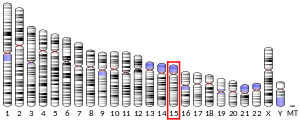From Wikipedia, the free encyclopedia
Protein-coding gene in the species Homo sapiens
Mesoderm development LRP chaperone , or MESD , is a protein that in humans is encoded by the MESD gene .[ 5] [ 6] [ 7]
^ a b c GRCh38: Ensembl release 89: ENSG00000117899 – Ensembl , May 2017^ a b c GRCm38: Ensembl release 89: ENSMUSG00000038503 – Ensembl , May 2017^ "Human PubMed Reference:" . National Center for Biotechnology Information, U.S. National Library of Medicine .^ "Mouse PubMed Reference:" . National Center for Biotechnology Information, U.S. National Library of Medicine .^ Nagase T, Miyajima N, Tanaka A, Sazuka T, Seki N, Sato S, Tabata S, Ishikawa K, Kawarabayasi Y, Kotani H, et al. (Jul 1995). "Prediction of the coding sequences of unidentified human genes. III. The coding sequences of 40 new genes (KIAA0081-KIAA0120) deduced by analysis of cDNA clones from human cell line KG-1" . DNA Res . 2 (1): 37– 43. doi :10.1093/dnares/2.1.37 PMID 7788527 . ^ Wines ME, Lee L, Katari MS, Zhang L, DeRossi C, Shi Y, Perkins S, Feldman M, McCombie WR, Holdener BC (Mar 2001). "Identification of mesoderm development (mesd) candidate genes by comparative mapping and genome sequence analysis". Genomics . 72 (1): 88– 98. doi :10.1006/geno.2000.6466 . PMID 11247670 . ^ "Entrez Gene: MESDC2 mesoderm development candidate 2" .
Nakajima D, Okazaki N, Yamakawa H, et al. (2003). "Construction of expression-ready cDNA clones for KIAA genes: manual curation of 330 KIAA cDNA clones" . DNA Res . 9 (3): 99– 106. doi :10.1093/dnares/9.3.99 PMID 12168954 . Scanlan MJ, Gordan JD, Williamson B, et al. (1999). "Antigens recognized by autologous antibody in patients with renal-cell carcinoma". Int. J. Cancer . 83 (4): 456– 64. doi :10.1002/(SICI)1097-0215(19991112)83:4<456::AID-IJC4>3.0.CO;2-5 . PMID 10508479 . S2CID 21839750 . Dias Neto E, Correa RG, Verjovski-Almeida S, et al. (2000). "Shotgun sequencing of the human transcriptome with ORF expressed sequence tags" . Proc. Natl. Acad. Sci. U.S.A . 97 (7): 3491– 6. Bibcode :2000PNAS...97.3491D . doi :10.1073/pnas.97.7.3491 PMC 16267 PMID 10737800 . Strausberg RL, Feingold EA, Grouse LH, et al. (2003). "Generation and initial analysis of more than 15,000 full-length human and mouse cDNA sequences" . Proc. Natl. Acad. Sci. U.S.A . 99 (26): 16899– 903. Bibcode :2002PNAS...9916899M . doi :10.1073/pnas.242603899 PMC 139241 PMID 12477932 . Hsieh JC, Lee L, Zhang L, et al. (2003). "Mesd encodes an LRP5/6 chaperone essential for specification of mouse embryonic polarity" . Cell . 112 (3): 355– 67. doi :10.1016/S0092-8674(03)00045-X PMID 12581525 . Clark HF, Gurney AL, Abaya E, et al. (2003). "The secreted protein discovery initiative (SPDI), a large-scale effort to identify novel human secreted and transmembrane proteins: a bioinformatics assessment" . Genome Res . 13 (10): 2265– 70. doi :10.1101/gr.1293003 . PMC 403697 PMID 12975309 . Gerhard DS, Wagner L, Feingold EA, et al. (2004). "The status, quality, and expansion of the NIH full-length cDNA project: the Mammalian Gene Collection (MGC)" . Genome Res . 14 (10B): 2121– 7. doi :10.1101/gr.2596504 . PMC 528928 PMID 15489334 . Veltman IM, Vreede LA, Cheng J, et al. (2005). "Fusion of the SUMO/Sentrin-specific protease 1 gene SENP1 and the embryonic polarity-related mesoderm development gene MESDC2 in a patient with an infantile teratoma and a constitutional t(12;15)(q13;q25)" . Hum. Mol. Genet . 14 (14): 1955– 63. doi :10.1093/hmg/ddi200 PMID 15917269 . Li Y, Lu W, He X, Bu G (2006). "Modulation of LRP6-mediated Wnt signaling by molecular chaperone Mesd" . FEBS Lett . 580 (22): 5423– 8. doi :10.1016/j.febslet.2006.09.011 PMID 16989816 . S2CID 9683744 .






